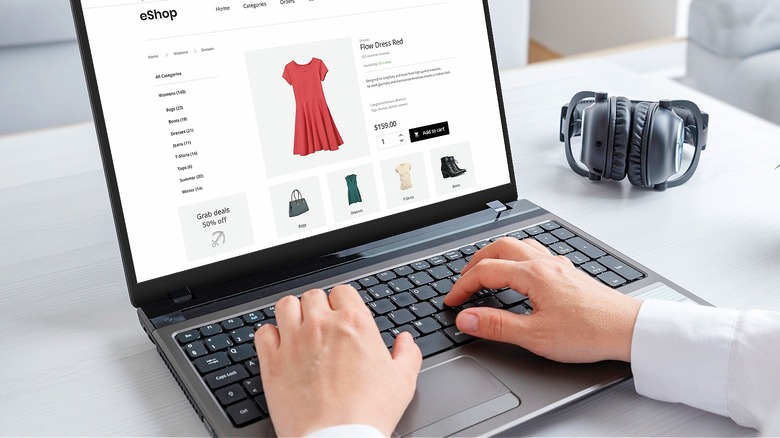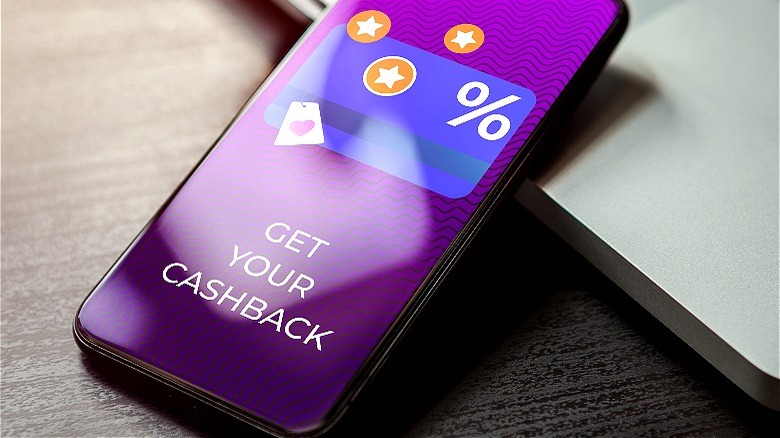Reconsider Using Your Debit Card When Shopping Online. Here's Why
When making an online purchase it can be easy to reach for whatever the first card in your wallet might be. You might think that, since it's all inevitably coming from the same place, it doesn't really matter which card you choose. Yet, there can be important advantages, and even potential financial risks, depending on exactly which card you decide to check out with. This can be especially true if you're deciding between using a debit card or a credit card.
For starters, while it might seem like credit cards and debit cards spend the same, there are some fundamental differences that can make for a different overall online shopping experience. Given that a debit card is directly connected to your checking account, it means that debit card transactions pull money directly from your bank or credit union account (hence why they can be used at ATMs to get cash). This direct account access is ultimately what can make using a debit card to shop online so dangerous.
Credit cards, on the other hand, are tied to a specific line of credit from your credit card issuer. You essentially build a balance, through purchases, over the course of your statement period that you then must pay off. In this way, you are technically spending your card issuer's money as opposed to your own. This one-step-removed form of purchasing is what can be a lifesaver when it comes to online shopping.
Debit cards and online safety
The main downside of using a debit card for online purchases comes down to security. Since a debit card pulls directly from your bank account, there is a much higher risk of financial loss in the event a hacker steals your physical card or card number. Depending on how long it might take you to notice your card was stolen or to notice false transactions, a hacker could empty the entire contents of your bank account.
Also, depending on your card type, as well as your banking institution, you could still end up on the hook for purchases depending on how quickly you report the fraud. While federal law (the Electronic Funds Transfer Act, to be specific) does limit your liability for unauthorized charges, you could still end up being liable for up to $500, or even more if you don't discover and report the fraud within 60 days. The only real way to ensure you aren't held financially responsible is if you report your card as stolen before any transactions take place — something that's not always doable.
Credit cards are considered safer to use for online shopping because the funds aren't being directly taken out of your bank account like with debit cards. Using a credit card can ensure you don't have to worry about your entire checking account being drained if it's hacked or becomes compromised. Per the Fair Credit Billing Act, the maximum liability for fraudulent credit card transactions caps at only $50.
Other reasons to use a credit card
Not only does using a credit card protect your bank account from hacking, but most credit card issuers also offer their own additional security and screening. From fraud alerts to notifications of suspicious purchases, your credit card issuer is more likely to identify a potential hack before you might. Plus, with a credit card transaction, there's more time to dispute a charge before money is actually taken from your bank account. Reporting a fraudulent charge found on your credit card statement can ensure you never lose a single penny, since most credit card issuers will issue a statement credit and handle the charge with the merchant directly.
In addition to the extra safety features that come with using a credit card instead of a debit card for online purchases, there can also be perks and rewards to consider. Depending on your specific credit card's terms, you might enjoy cash back, points, or rewards for making purchases. These can not only add up to extra money and savings but are also one of the biggest differences between credit cards and debit cards, which traditionally have no such additional perks for use.
If you don't have a credit card, you might consider keeping a separate debit card (and associated account) just for online purchases. By keeping a low balance on this account, and ensuring you have enabled your bank's overdraft protection on the account, you can minimize any financial risk in instances of fraud. Doing so can allow you to shop online with your debit card — and with more peace of mind.


